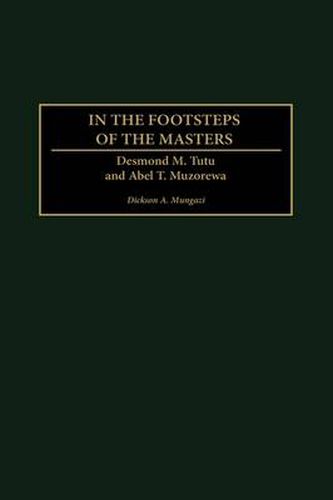Readings Newsletter
Become a Readings Member to make your shopping experience even easier.
Sign in or sign up for free!
You’re not far away from qualifying for FREE standard shipping within Australia
You’ve qualified for FREE standard shipping within Australia
The cart is loading…






The height of colonial rule on the African continent saw two prominent religious leaders step to the fore: Desmond Tutu in South Africa and Abel Muzorewa in Zimbabwe. Both Tutu and Muzorewa believed that Africans could govern their own nations responsibly and effectively if only they were given the opportunity. In expressing their religious views about the need for social justice each man borrowed from national traditions that had shaped policy of earlier church leaders. Tutu and Muzorewa argued that the political development of Africans was essential to the security of the white settlers and that whites should seek the promotion of political development of Africans as a condition of that future security. Desmond Tutu and Abel Muzorewa were both motivated by strong religious principles. They disregarded the possible personal repercussions that they might suffer as a result of their effort to alter the fundamental bases of their colonial governments. Each man hoped to create a new national climate in which blacks and whites could cooperate to build a new nation. Each played a part in eventual independence for Zimbabwe in 1980 and for South Africa in 1994. Mungazi’s examination of their efforts reveals how individuals with strong convictions can make a difference in shaping the future of their nations.
$9.00 standard shipping within Australia
FREE standard shipping within Australia for orders over $100.00
Express & International shipping calculated at checkout
The height of colonial rule on the African continent saw two prominent religious leaders step to the fore: Desmond Tutu in South Africa and Abel Muzorewa in Zimbabwe. Both Tutu and Muzorewa believed that Africans could govern their own nations responsibly and effectively if only they were given the opportunity. In expressing their religious views about the need for social justice each man borrowed from national traditions that had shaped policy of earlier church leaders. Tutu and Muzorewa argued that the political development of Africans was essential to the security of the white settlers and that whites should seek the promotion of political development of Africans as a condition of that future security. Desmond Tutu and Abel Muzorewa were both motivated by strong religious principles. They disregarded the possible personal repercussions that they might suffer as a result of their effort to alter the fundamental bases of their colonial governments. Each man hoped to create a new national climate in which blacks and whites could cooperate to build a new nation. Each played a part in eventual independence for Zimbabwe in 1980 and for South Africa in 1994. Mungazi’s examination of their efforts reveals how individuals with strong convictions can make a difference in shaping the future of their nations.